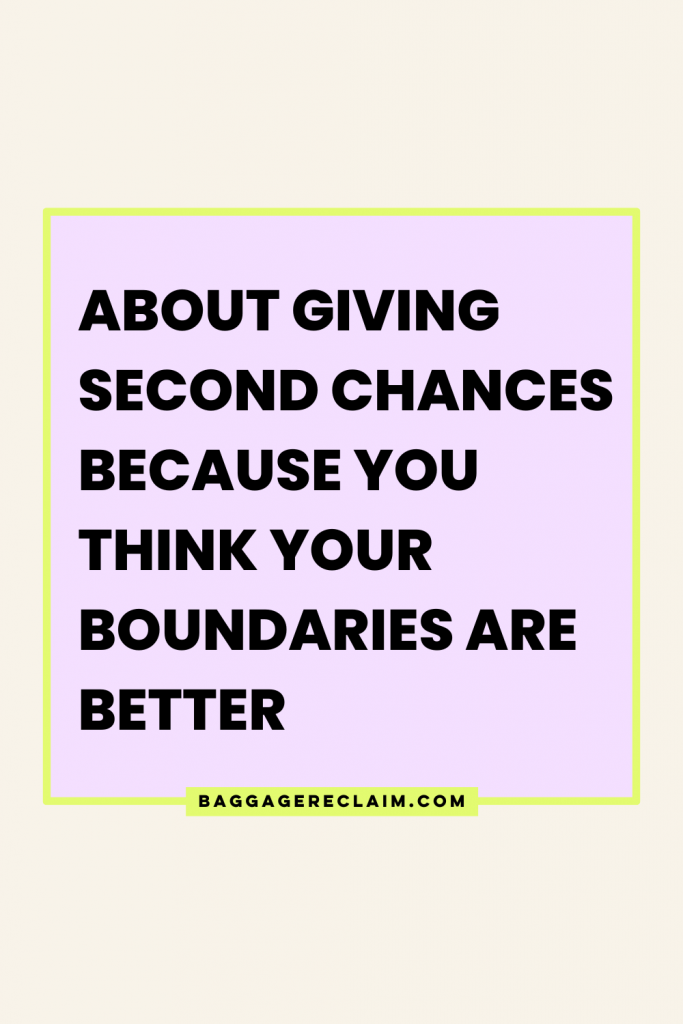A challenge we face when we’re consciously going out of our way to create healthier boundaries after recognising where we need to break unhealthy patterns is an internal debate about giving somebody who hurt or let us down a second chance.
It’s particularly difficult when the person seeks us out. Debating with ourselves over giving the second chance can feel like a test we’re afraid of failing. Give it and everything works out hunky-dory, and we get to pat ourselves on the back. But give it and the person does the same or worse again and we spiral into blame and shame.
The doubt, guilt and sense of obligation we experience can throw us into a tailspin. Because the person is seeking a second chance, we think saying no or not letting them back into our life to the same degree as before is ‘unforgiving’ and ‘bearing grudges’.
In fact, we humans often conflate requests for a second chance with the person’s desire to change. Hell, sometimes we even take it as proof of they’ve already changed. There’s also often an underlying belief that maybe what happened was purely the fault of our own boundaries so giving this person a second chance will be a way of testing how much we’ve grown. We figure we should be more, you know, ‘resilient’ now.
Should we give a second chance now that our boundaries are better? Or, should we not give the second chance precisely because we’ve evolved our boundaries?
For starters, we need to take the ‘should’ out of giving somebody a second chance. This means acknowledging that we’re not sure or even that we don’t want to. Emotionally blackmailing and obligating ourselves into giving a second chance would override our boundaries.
We need to know our ‘why’ when deciding whether to give somebody a second chance because the intentions and motivation behind a decision dictate how we’ll feel in the aftermath.
What, if anything, do we hope to get back in return if we go ahead? What do we think will or should happen? The more honest we can be, the healthier a decision we can make. Let’s say we give this person a second chance and they don’t respect our boundaries. Will we be able to handle this from a boundaried place? Or, will we take it personally and spiral into blaming and shaming ourselves?
If the person we give a second chance to doesn’t have healthy boundaries and expects us to engage at our previous level of boundaries, it’s only a matter of time until it’s pain and problems.
Our intention may be to give another chance, to show support, but the result is that this person will interpret this as a green light to recreate the same problem. If we keep responding with our intentions without awareness of the impact and the truth, we will keep getting the same undesired results because we’re too focused on how we want us and others to look.
By giving out second chances to test the progress of our boundaries, we set ourselves and others up to fail. There is no need for us to set ourselves unnecessary and painful tests just to prove a point to ourselves. That’s us trying to control the uncontrollable and trying to right the wrongs of the past. If we’re going to give someone a second chance, it must be because regardless of what they do or don’t do, we’re going to have better boundaries anyway.
Are you ready to stop silencing and hiding yourself in an attempt to ‘please’ or protect yourself from others? My book, The Joy of Saying No: A Simple Plan to Stop People Pleasing, Reclaim Boundaries, and Say Yes to the Life You Want (Harper Horizon), is out now.

Pin for later


 Add to favorites
Add to favorites 